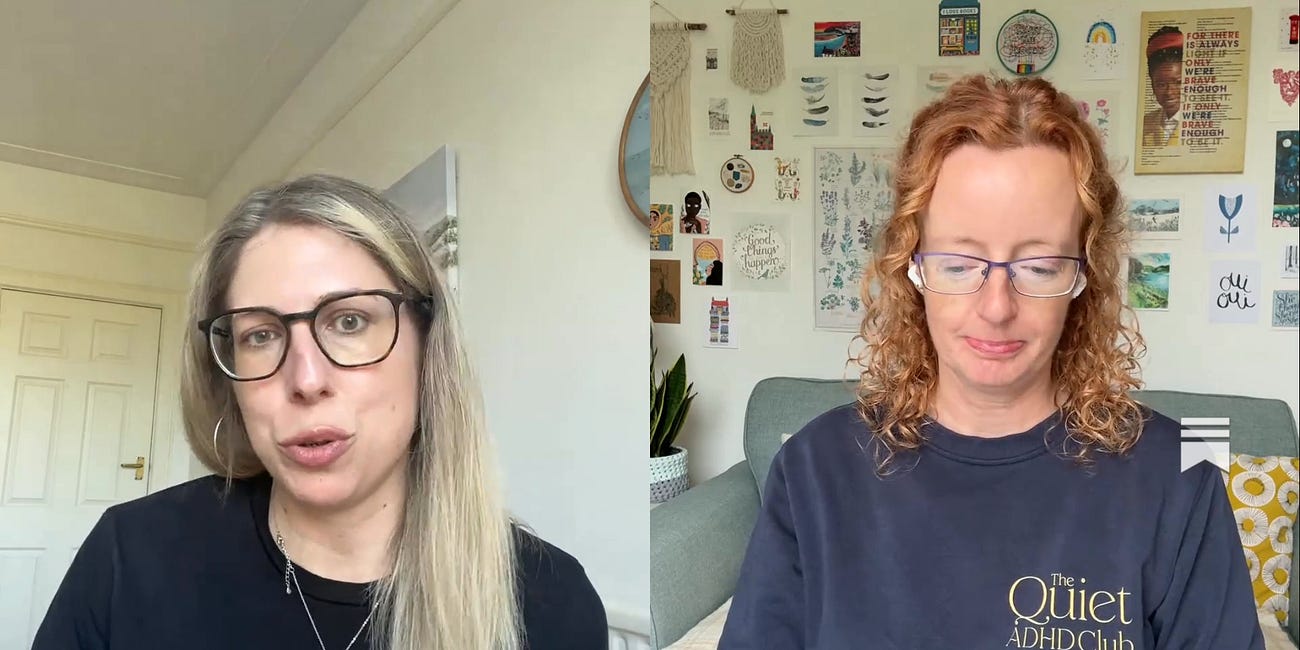What unmasking really looks like
Now you see pretend me, now you don't! Yeah, that's not it.
Pre-S: If you’re an introverted, sensitive woman who has, or you think you might have ADHD take a look at the Quiet ADHD Club here, I made it especially for you.
This month we’re exploring our super sensitivity to criticism and rejection (real or perceived) aka Rejection Sensitivity Dypshoria, plus there are our regular accountability threads, body-doubling sessions and Q&A.
Hi lovely,
I heard
speak recently about his late-discovered ADHD while on a bookshop tour for his book, Normally Weird and Weirdly Normal. As a comedian and podcaster he knows a lot of people, including fellow comedian Rory Bremner. He remarked that once Rory was diagnosed with ADHD he seemed to act like someone with ADHD. Then Robin realised Rory wasn’t acting like someone with ADHD, he was dropping the mask, no longer trying to be neurotypical, and so his natural ADHD self was showing through.Yesterday I opened the washing machine to find a wet load that had been sitting there for a couple of days. Out loud I said to myself, “I’m becoming that person.” And then I stopped and remarked again to myself, “No, I’m revealing the person I am.”
This is what I understand dropping the mask to look like.
We can think it’s suddenly behaving completely differently to how you’ve acted for the past several decades. We’ve worn the mask and now we don’t, like it’s a binary, all or nothing thing.
I don’t think it’s necessarily a conscious action where you recognise all the ways you’ve been striving to be neurotypical and now you’re going to instantly become your full neurodivergent self. After all, one of the questions so many of us who discover later in life that we’re neurodivergent ask is, ‘Who am I if I’m not who I thought I was?’
And so I think that unmasking is complex, not least because you’re learning what about your way of being in the world is masking and what isn’t.
So we may unmask in little or big ways. It can be subtle or obvious. Noticeable to others or just ourselves.
It can look like struggling to do something you’ve managed to do for years,
calls this skills regression.It can look like gently swaying or fiddling with your hair or turning over a smooth pebble in your hand while you’re in conversation because it’s soothing and helps you focus.
It can look like giving yourself a break when you forget someone’s name or get appointment dates muddled or lose your phone, instead of beating yourself up about it.
It can look like telling someone that you get lost following verbal instructions and jotting them down instead.
It can look like allowing yourself to go all in on a new hobby that you’re getting so much joy from while knowing the time will come when you lose all interest and drop it – and being okay with that.
It can look like letting your colleagues know at the start of a meeting that your doodling means you’re listening more closely than you would be if you were sat still.
It can look like telling a friend you’d love to celebrate their birthday with a walk and an ice cream instead of going to their glitzy party.
It can look like letting someone else be the organiser because you’ve taken the lead for years to try to prove yourself and you no longer feel such a strong need to.
It can look like chatting excitedly with a fellow neurodivergent friend about all the things that interest you both, letting your conversation jump and dart about without apology.
It can look like wearing noise-cancelling earphones or headphones in crowded public spaces and not worrying so much about what people might think of you.
And that’s a crucial component of unmasking – worrying less about what other people are thinking of you and being more compassionate and comfortable with yourself.
We’ve been masking without knowing it for so long because of wanting to not let anyone down, to not see the disappointment in their face, hear it in their sigh or see it in the shake of their head. We’ve needed others to think well of us, to think we’ve got it all together, we’re organised, in control and capable. We’ve been trying to look like we’re gliding along the surface of the water while underneath we’re paddling like crazy to stay afloat.
But when the mask cracks, slips or dissolves (depending on how you feel about it) we’re showing our true selves. Our interesting and interested, creative and resilient, imperfect and glorious neurodivergent selves. No better and no worse than those with a neurotypical brain, just different.
There will be more to write on unmasking. For now I’d love to know, what does unmasking look like for you?
In the Quiet ADHD Club this month…
Something that pretty much all ADHDers (and many other neurodivergents too) experience is a super sensitivity to criticism and rejection, know as Rejection Sensitivity Dysphoria or RSD.
One sentence, one word, a look, a tone of voice can be enough to make us feel like the worst person, instantly shutting down or flying into a rage. Even if we just think we’re being criticised it’s enough to provoke a strong visceral and debilitating reaction.
RSD can be the hardest ADHD feature to deal with because it happens so quickly it seems completely out of our control, and because it feels so. utterly. unbearable.
Which is why we’re tacking it head on in the latest deep dive Exploration topic.
Plus we have our usual twice-weekly body-doubling sessions, accountability threads, Q&A…
To find out more about the Quiet ADHD Club for introverted, sensitive women who have or think they have ADHD, and join, click the button below.
Listen…
I had the joy of chatting with
on a Live for her Burn Bright, Not Out series about making taking care of your own wellbeing doable, rejecting wellness gurus, being more self-compassionate, building your self-trust and so much more!There’s also a new 10mins-long episode of the Pressing Pause podcast available to you – Ep 149 When name-calling has its uses.
You’ll find all the episodes for my Pressing Pause podcast here or on your favourite podcast player.
Until next time,
Two ways you can get support
I help quiet, introverted, sensitive, empathetic women who have or think they may have ADHD to understand, accept and love themselves, to work with their brain and natural traits, so they can experience more calm, joy and freedom every day.
❤️ The Quiet ADHD Club
The Quiet ADHD Club is an online space where you can find guidance, practical tools and strategies, and connection, including accountability, body-doubling sessions, deep dives into ADHD challenges, Q&As and guest experts. Find out more and join the membership here.
💜 Bespoke coaching
Whether you’re just beginning to recognise potential ADHD traits in yourself or you’re on a long waitlist for an assessment or you’ve had this self-knowledge for a while, it can be a LOT to process as you look back on how your life has been and look ahead to want you do with this information.
Click here to find out how one-to-one coaching can support you to work with your ADHD brain, embrace your nature and your strengths, and thrive in a calm and joyful life of your design.
Go gently, you’re not alone, we’re in this together.
Posts you may also enjoy reading…
From super productive to procrasti-faffing






This is helpful. By the way I am always leaving washing in the machine. I definitely feel like im unmasking. We live in a neurotypical world though. When I asked for support in my work place, which was unmasking for me, it was seen as 'not coping'. Maybe its a good thing as it gave .e the chance to leave.